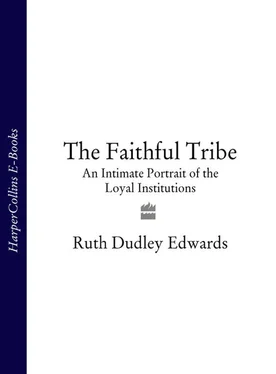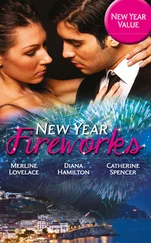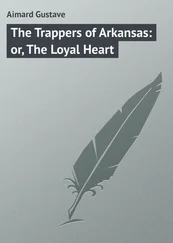William Bingham, now a Presbyterian minister, reminisces about a much more recent period in County Armagh: ‘I first paraded with the institution in 1969 in Markethill, where I was brought up. I was about six years of age when my uncle took me and my brother and my cousin with him to hold the strings of the banner: my grandmother made little Orange collarettes for us. *
‘When you were growing up, you played at being Orangemen. Weeks before the Twelfth, all the youngsters in the town got together and had a ceremony in the yard and formed their own Orange Lodge – you’re talking about six-, seven-, eight-year-olds. And we used to get tin boxes and make banners out of cloth and sticks and we paraded by people’s houses or up and down the yard and we had a really good time together. We were very democratic in electing a worshipful master. We voted on it and usually everyone got their turn at it.
‘We really looked forward to the Twelfth: you used to think that when that was over, your summer was over. The highlight of it was gone. For us it was a day where you met all your friends from school that you hadn’t seen for the weeks of the summer holidays: maybe some of their fathers were on parade or some of them were in the bands playing the cymbal or the triangles or a wee accordion or something. You all met in the field and you had tea and sandwiches and then you played around for a while and then you came home again. It was just a unique occasion. There was nothing like it the rest of the year.
‘I suppose the things that you were mesmerized by were the colour – the paintings on the banners, the crowds of people – and the music – the bands. I really loved the silver bands. My father played the tenor horn and went on parade. My mother would have been making sandwiches: she did the picnic. And my sister, she didn’t get parading, only the boys. She was left out of it a wee bit.
‘For my aunts and great-aunts – many of whom were married to farmers – it was literally the only day out they got in the year. The Twelfth of July came and they worked hard to get the harvest cleared up and the best suits cleaned and looked after their husbands. Rarely if ever would they have been out anywhere else except church. Certainly they’d have had no holidays. I had uncles that wouldn’t miss the Twelfth of July, but they wouldn’t go to their own sons’ or nephews’ weddings.’
Elaine McClure, Worshipful Mistress of a women’s lodge, does not feel part of the community in nationalist Newry.
I do feel very close to my friends in that town, my neighbours, but I feel that’s completely different from, if you like, as a person coming from the community I come from, trying to identify with the symbols of local government in that town.
As T. S. Eliot says: ‘I can connect nothing with nothing’ … But certainly within the company of people who share the same culture as I do, I can connect. I can connect with their outlook, with the music, with the symbols on the banner, with the ethos and the reason behind a social gathering.
I walk on the Twelfth – I don’t march … My blood family … introduced me to the Twelfth and now my Orange family take me along with them on the Twelfth of July. I walk in the road with the men of Sheepbridge.
I know those men. I know their ladies. I know their families, I know who they are and they’re good, they’re decent people. And I walk with them and in the front is the band and my cousin’s in the band and I’m walking in the road and I’m thinking how like my uncle Joe our William is because Uncle Joe was the one who took me first to the Twelfth of July. And I walk in the road with them hoping they’re not going too quick and I’ve got the right shoes on my feet and then we wait at the hall and then when all the lodges come we all walk off again and the drum beat’s given and the banners are hoisted and we start on our way.
And I remember thinking last Twelfth of July how lucky I am to be part of this – and that’s not to deride anyone else who comes from a different culture – but how lucky I am to be walking with such good, kind people and to have the colour and the music that I can listen to. To meet up with people that perhaps I haven’t seen for the last twelve months. All you have to do is just say: ‘Hello, how are you?’ and the connection is made and the friendship is there. And to go back to the hall at the end of the night and have a meal and to sit again in the company of the sisters and the brethren of Sheepbridge – it’s a wonderful warm feeling just of a family coming together. The Twelfth of July is our family occasion.
However, David Cook, Alliance politician and ex-chairman of the police authority, puts forward a view very common among middle-class Protestants whose liberalism doesn’t extend to trying to understand the ordinary Orangeman.
The first thought about the Twelfth each year is how can we get away. I have spent most Twelfths in Donegal (often infuriated by RTE’s [Radio Telefis Eireann] naive view of the Twelfth as no more than a folksy cultural festival). I have been lucky enough to be in Northern Ireland on only a handful of Twelfths in my life. One was a memorably hot day in the middle Seventies when I pushed our baby daughter in a pram from the Ormeau Road along the embankment all the way to Shaw’s Bridge where I saw the drunken crowds in full swing.
I have never actually set out to watch a Twelfth parade. I have never taken my children to watch one. I have never believed that Protestantism needs to be, or indeed, can be defended by the usual public manifestations of Orangeism. And I have never been taken in by the claims that there is no other purpose in them than the display of a much loved cultural tradition. I have always known that one of the historical purposes of those public manifestations, and this remains true today for some Orangemen some of the time, is to annoy and antagonize Catholics.
The claim that the Twelfth is the greatest cultural festival in Europe, with its bands, banners and music, may, I think, be true. But I do not believe the assertion that the Twelfth is no more than a good-natured cultural event and a large family picnic. That is the purest hypocrisy and the biggest lie. The problem which the Orange Order has to face is that very few people outside their community believe the lie.
Marietta Farrell, lecturer and SDLP activist, had never heard of the Twelfth until she went to Northern Ireland from the Republic as a student in the 1970s.
I found the whole thing quite colourful and quaint if somewhat threatening. I was bemused at the sight of so many men, in what was to me, City of London business dress, looking so intent and serious. I admired the skill and the colour of the bands but I found their swagger and the wording of their songs intimidating and offensive. I was also surprised at the lack of women in the ‘celebration’. From what I could see, women stood on the sidelines and cheered the men. I wondered why loyalist women were not more central in their important annual celebration. [Until Drumcree 1996] I neither thought nor learnt much more about the Twelfth. It seemed to have nothing to do with me.
To the best of my knowledge, I was never in the company of an Orangeman.
Decorations and associated festivities
Glen Barr, famous for his leadership of the Ulster Workers’ Strike in 1974 and now a community worker, grew up in Londonderry.
Through all the seasons of marbles, hoops, bows and arrows, cowboys and indians, Easter eggs, Christmas stockings and bin lids to sleigh with, we always knew when the big day was near.
The Craigavon Pipe Band which practised at the top of King Street at the back of Harry McLaughlin’s carpenter shop and which we all joined at ten or eleven years of age, was at it three nights a week instead of the customary Wednesday nights. The men and women of the street were making bows from the wood shavings from Harry McLaughlin’s and dyeing them red, white and blue in tin baths at the back of the band shed. The other emblems on the Arch were cleaned up and painted and all the light bulbs checked and renewed where necessary. Buntings were being rescued from old sacks and tied across the street from downpipe to downpipe.
Читать дальше












